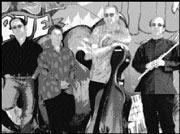ICEBREAKER: VOICES FROM NEW RUSSIA
Benaroya Recital Hall, Third and Union, 286-5052, $25 8 p.m. Fri., Feb. 8; 2 p.m. Sat., Feb. 9; and 8 p.m. Sun., Feb. 10
FOR AMERICAN concertgoers, Dmitri Shostakovich remains the model of a Soviet composer. Our notion of musical life in the Soviet Union stems from what we know of his career and the tormented relationship he had with his government—the roller-coaster cycles of official disapproval and adulation. But the collapse of the Soviet Union was not entirely a boon for composers. They no longer had to work, as Shostakovich did, under the strictures of socialist realism— in which Marxist doctrine and moral uplift were the highest aesthetic values, packaged in a voice-of-the-people harmonic and melodic style slavishly derived from folk music. But there was also, as Seattle musicologist Elena Dubinets points out, a “price paid for freedom from ideological restrictions.”
Many state-run musical institutions, especially in the provinces, collapsed after the fall of Communism. Financial support—the state-sponsored system of grants or commissions—dried up. Even the most basic elements of the musical “scene,” things Western composers take for granted, have suffered; according to Dubinets, there is one classical radio station in the former Soviet Union, no sheet music distributors, and hardly any communications infrastructure, such as Internet or even reliable phone service.
Musical life in today’s Russia will be the focus of a conference held this weekend, organized by Dubinets and the Seattle Chamber Players (SCP). “Icebreaker: Voices From New Russia” offers a packed three-day schedule of papers, discussions, and three concerts, featuring music by 21 different composers, mostly established names in their 40s and 50s, whose careers started under Soviet rule and who have had to adjust to new realities.
Some composers emigrated: For example, Nikolai Korndorf, who died unexpectedly last May, had set up shop in Vancouver, B.C. Works both written by him and paying homage to him will appear in “Icebreaker” concerts. An unprecedented level of musical contact with America has recently exposed composers to new ideas—minimalism and electronic music in particular; these concerts will include several intriguing examples of Russian experiments in these idioms.
Russian composers have been free to explore their own paths in recent years because of the lack of a single dominant figure—no one of the overwhelming stature of Shostakovich, Prokofiev, or (from the following generation) Alfred Schnittke. These successful musicians had become too-convenient role models, and many midcentury Soviet composers ended up as a sort of Shostakovich Lite, says SCP violinist Mikhail Schmidt, who himself grew up in Soviet Russia.
“Icebreaker” is the inverse of a four-day American music festival that the SCP brought to Moscow in December. They strove to present the widest possible stylistic range to show eager Russian audiences that there is, in Schmidt’s words, music “beyond Ives, Reich, and Cage.”
Some composers represented in “Icebreaker” have found a way to put socialist realist principles to fresh use—like Vladimir Martynov, whose catchy People’s Dance revitalizes the embrace of the vernacular with the rhythmic grooves of minimalism. Whatever the constrictions of Soviet musical life, it did encourage composers to avoid the academic aridity of some Western music of the last century. Always urged to keep the listener in mind, Russian composers (despite financial insecurity) now find themselves in a strong position: They can explore new ideas while retaining the ideal of direct and powerful communication. The results, as “Icebreaker” will demonstrate, are pretty exciting.







